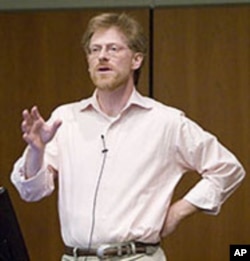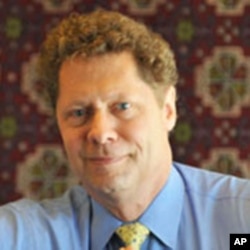May 18th is Aids Vaccine Awareness Day. And while a vaccine remains elusive, scientists are encouraged by developments over the past year.
Tuesday, AVAC, the AIDS Vaccine Advocacy Coalition, released part of a new report on the effects of a vaccine trial in Thailand last year. The full report – Turning the Page - will be released in July at the 18th International AIDS Conference in Vienna.
This one’s special
AVAC Executive Director Mitchell Warren says, “We have historically published a report on the state of the vaccine field now for 15 years. And it’s been 15 years of watching and waiting and really advocating and agitating.”
He says, “This vaccine awareness day is special. This is the first time though that we’ve done it in the context of a clinical trial result that tells us that an AIDS vaccine is truly possible.”
Last September, the results were released for RV144, also known as the Thai Prime Boost study.
The vaccine candidate showed a 30 percent efficacy rate. Too low to use, but good enough to encourage researchers, following earlier disappointing trials of other candidates.
“It was a huge undertaking – 16, 400 person trial,” he says, adding, “The result released late last year was a game changer. We really see this as a new chapter in the development of an AIDS vaccine. I think in history we will look back and realize that the Thai vaccine result was a turning point.”
Doing better
Warren says since the Thai trial there have been many meetings analyzing the results and what to do next. “And that debate is ongoing,” he says, “There’s a great deal of uncertainty about what that result means and what to do with it.”
The AVAC executive director says the vaccine research field needs to do “three things with urgency.”
“One, it needs to aggressively understand why the Thai vaccine seems to have worked at least in some people. Secondly, we have to build on that result. And there’s an enormous amount of discussion now about testing similar vaccines to the Thai combination,” he says, “to try to do better than that 30 percent.”
His third recommendation calls for “diversifying the scientific portfolio.”
“While it’s important we chase down the result in Thai vaccine combination, we also need to look at different approaches entirely because we still don’t know exactly why that vaccine worked,” he says.
A fourth thing
“Given the resource constraints…the field has to do a fourth thing above and beyond the science. It has to show itself able to operate with greater efficiency and with greater prioritization. Some projects need to be stopped. Some projects need to be scaled down. Other projects need to be scaled up. And certainly new projects need to be begun,” he says.
He says there are some “very difficult” decisions that have to be made.
Also, IAVI, the International AIDS Vaccine Initiative, says “Making a vaccine against HIV remains one of the toughest problems of modern science.” However, it, too, finds encouragement in that Thai trial.
It calls for “harnessing the latest scientific insights and technological tools to generate potentially more promising HIV vaccine candidates for human trials.”
IAVI CEO and founder Dr. Seth Berkley says, “With 7,400 people newly infected with HIV every day, the best hope we have of ending this human catastrophe is to develop and widely distribute effective vaccines against the virus.”
However, IAVI says success depends on the “continued support” of policymakers, advocates, community representatives, researchers, NGOs, donors and volunteers.





